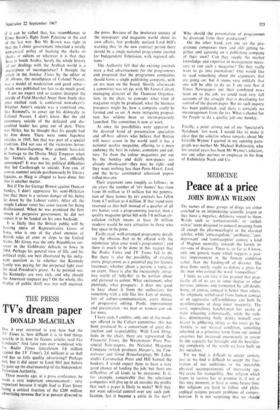TV's dream paper
THE PRESS DONALD McLACHLAN
Has it ever occurred to you how bad the TV Times is, how difficult it is to find things quickly in it, how its feature articles read like handouts? And have you ever wondered why the Radio Times (circulation 3.6 million against the TV Times's 2.6 million) is so dull and has so little quality advertising? Perhaps not; but it did occur to Lord Hill just before he gave up the chairmanship of the Independent Television Authority.
Three months ago, at a press conference, he made a very important announcement: very important because it might lead to Fleet Street losing a critical fraction of the £200 million advertising revenue that is at present directed to the press. Because of the inveterate secrecy of the newspaper and magazine world about its own affairs, few probably noticed Lord Hill's warning that 'in the new contract period there should be a single national programme journal for Independent Television, with regional edi- tions.'
The Authority felt that the existing journals were a bad advertisement for the programmes and proposed that the programme companies should form a single publishing company, with an Ira man on the board. Shortly afterwards a committee was set up, with Mr James Coltart, managing director of the Thomson Organisa- tion, in the chair, to consider what kind of magazine might be produced, what the business prospects might be, how a company could be formed and so on. A more intriguing proposi- tion has seldom been so inconspicuously launched. The committee is now at work.
At once the possibilities were apparent to the devoted band of presentation specialists and off-beat editors who believe that Britain will never count in the world until it has a national quality magazine, offering to a mass audience the best in colour, comment and cul- ture. To them the colour magazines put out by the Sunday and daily newspapers are
already obsolescent—they may be right—and they want nothing less than Paris-Match, Look and the better continental television papers rolled into one.
Their argument runs roughly as follows: in six years the number of 'us/ homes' has risen from 10 million to 15 million but the penetra- tion of these homes by as/ journals has fallen from 4.7 million to 4 million. If that trend were reversed so that half instead of a quarter of all Iry homes took a programming journal, then a quality magazine (price 8d) with 7-8 million cir- culation (which means at least 20 million readers) would be very attractive to those who buy space in the press.
Easily-read, well-arranged programme details are the obvious bait to be offered with the injunction 'plan your week's programmes'; and
there is much to be done in this respect that the Radio Times and TV Times fail to do.
But there is also the possibility of treating every programme as a potential peg for feature treatment, whether about a person, a topic, or an event. There is also the increasingly attrac- tive world of 'telly-biz' to be written about and pictured in colour. What excitement, what plenitude, what prospects: it does one good
to hear about it from the enthusiasts for something with a title like See. Lots of money,
lots of culture-communication, every device of progressive editing. Profit, improvement and presentation—no man or woman can ask for more.
I have seen, I confess, only one of the mock- ups offered to the Coltart committee; this has been produced by a consortium of great dis- tinction and respectability. With Lord _Drog- heda in the chair, there are represented the
Financial Times, the Westminster Press Pro- vincial Newspapers, the National Magazine Company (which produces Harper's. the Con- noisseur and Good Housekeeping), Mr Labo- vitch's Cornmarket Press and Hill Samuel the bankers. I would expect them to have a very
good chance of landing the job; but there are difficulties of all kinds to be overcome. Is it, for example, conceivable that the television companies will give up to an outsider the profits that such a paper is likely to make? Will they not want editorial control over any such pub- lication, lest it become a critic in the nest? Why should the presentation of programmes be divorced from their production?
On the other hand, can one see the pro- gramme companies (new and old) getting to- gether and agreeing on a publishing company of their own? Can they supply the market knowledge and expertise in management neces- sary to run such a magazine? Do they really want to go into journalism? One would like to read something about the arguments that are going on; but it seems very unlikely that one will be able to do so. I am sure that if Times Newspapers put their combined news team on to the job, we could read very full accounts of the struggle that is developing for control of the dream paper. But no such inquiry has been published; and there is certainly no encouragement from the 1TA. What a chance for the People to do a quality job one Sunday.
Finally, a point arising out of my 'Spectator's Notebook' last week. I would like to make it clear that the solicitor whose remarks about Mr Greville Wynne I quoted in my opening para- graph was neither Mr Michael Rubinstein, who for several years has been Mr Wynne's solicitor, nor any other partner or employee in the firm of Rubinstein Nash and Co.


































 Previous page
Previous page